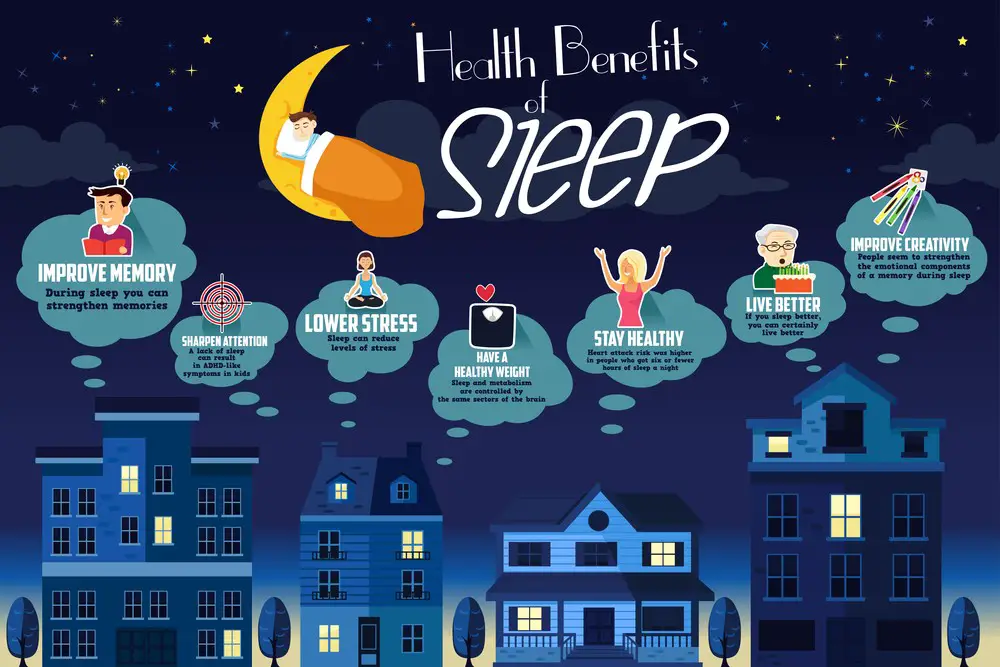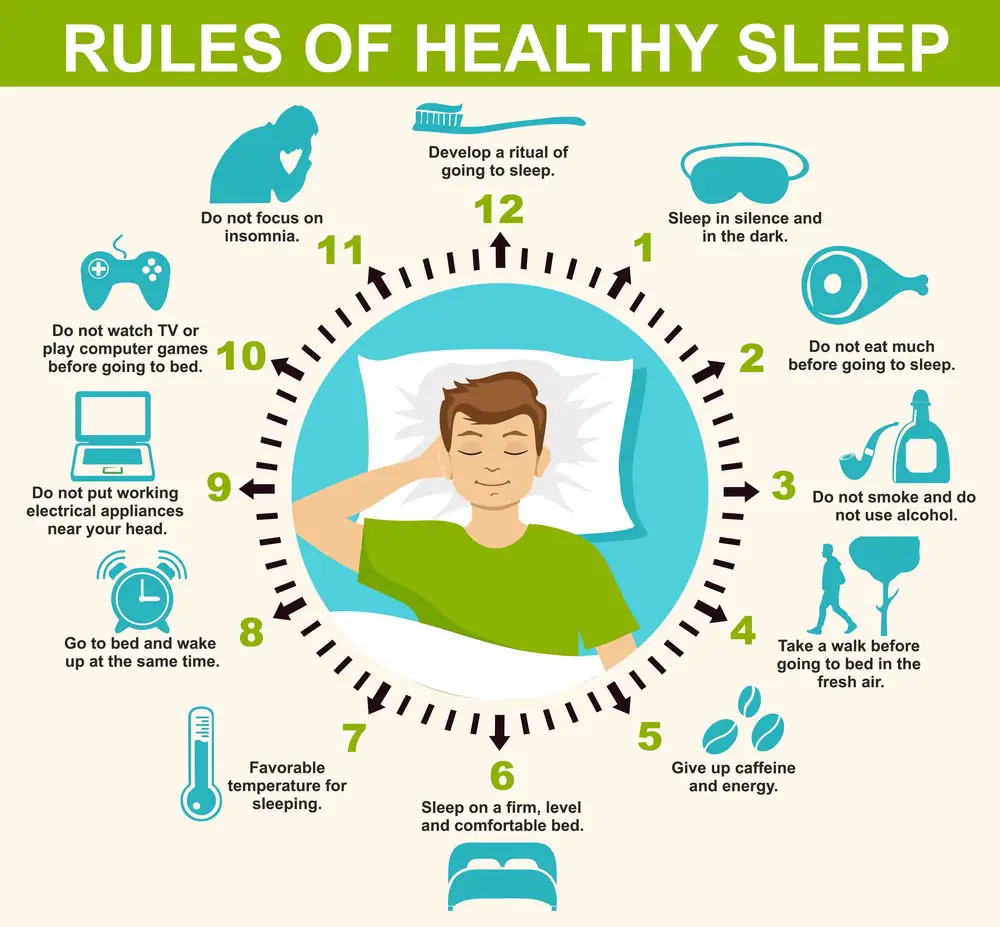As a BetterHelp affiliate, we receive compensation from BetterHelp if you purchase products or services through the links provided
Getting enough sleep is essential for physical and mental well-being, but sometimes it can be difficult to achieve. This raises the question: Are 3 hours of sleep better than none? In this blog post, we will explore what happens when you don’t get enough sleep, how much adults need on average, the benefits of a good night’s rest, and finally, answer whether or not three hours is better than nothing. Read on to learn more about how getting three hours of shut-eye could affect your health and wellness!
Table of Contents:
Table of Contents
What Happens When You Don’t Get Enough Sleep?
Physical Effects: When you don’t get enough sleep, your body can suffer in many ways. Not getting the recommended 7-9 hours of sleep per night can lead to fatigue, headaches, and weakened immune systems. Your physical performance may also be affected as lack of sleep leads to slower reaction times and decreased coordination. You may also experience increased stress levels which can cause various physical symptoms such as muscle tension, chest pain, rapid heartbeat or even digestive issues.
Mental Effects: Lack of sleep has been linked to mental health problems such as depression and anxiety. It can also make it difficult for you to concentrate on tasks or remember recently learned information. Additionally, it is common for people who are not getting enough restful sleep to have difficulty making decisions or managing their emotions effectively due to exhaustion from a lack of quality restorative shut-eye time each night.
Without enough sleep, the body and mind can suffer from various physical, mental, and cognitive effects. To better understand how much sleep adults need on average to maintain good health, let’s look at the recommended hours for adults and factors that may affect individual sleep needs.
How Much Sleep Do Adults Need On Average?
Adults need 7 to 9 hours of sleep per night to function optimally. The amount of sleep required varies from person to person and is affected by age, lifestyle, and health.
Recommended Hours of Sleep for Adults
The National Sleep Foundation recommends that adults aged 18-64 get between 7-9 hours each night. Those over 65 should aim for 7-8 hours. Teens require 8-10 hours, while school-age children need ten or more daily hours. Babies and toddlers require even more, with newborns needing up to 17 hours per day.
Factors That Affect Sleep Needs
Many factors can affect how much sleep you need, including your physical activity level, stress levels, diet, medications, and any underlying medical conditions such as insomnia or anxiety disorders. Age also plays a role in determining the amount of sleep needed; younger people tend to require more than older people due to their higher energy needs. Additionally, shift work or jet lag can disrupt standard sleeping patterns, which may result in the market for additional therapeutic sleep time during off days or vacations when possible.
Signs Of Not Getting Enough Sleep
When you don’t get enough quality sleep regularly, it can lead to fatigue throughout the day, difficulty concentrating on tasks at hand, and decreased overall performance, both mentally and physically. Other signs include irritability or mood swings, headaches or body aches, and an increased risk for illness due to weakened immune system functioning from lack of restful slumbering periods (REM cycles). It is essential that if these symptoms are present, then seeking professional help might be necessary so that a proper diagnosis can be made, followed by an appropriate treatment plan tailored specifically for individual needs accordingly.
Benefits of a Good Night’s Sleep
Not getting enough sleep can harm physical, mental, and cognitive functioning. Adults should aim to get 7-9 hours of quality sleep each night to reap the benefits of a good night’s rest.
Improved Memory and Concentration: Quality sleep helps improve memory formation, recall, and concentration. During deep sleep, our brains can process information more efficiently, which leads to improved memory formation and recall during waking hours. Studies have also shown that people who get adequate amounts of quality sleep are better able to focus on tasks throughout the day than those who don’t get enough restful shut-eye.
Reduced Stress and Anxiety Levels: Sleep plays a vital role in regulating stress hormones such as cortisol which can help reduce feelings of anxiety or depression when they become too high due to a lack of restful slumber. Getting regular amounts of quality shut-eye helps keep these hormones at healthy levels so we feel more relaxed during waking hours instead feeling overwhelmed by stress or anxiousness about life events or situations.
Improved Mood and Emotional Well-Being: When we don’t get enough quality sleep, it affects our moods negatively because it impairs our ability to think clearly or make decisions easily without becoming frustrated quickly or overreacting emotionally when faced with challenges throughout the day. Adequate amounts of restful slumber help us stay calm even under pressure while keeping emotions balanced so we can respond appropriately in any situation without letting them control how we react toward others around us.
Overall, getting plenty of quality shut-eye has many positive effects on physical, mental, emotional, and cognitive functioning. Adults need to strive for 7-9 hours per night for their bodies and minds to receive all the benefits of having a good night’s rest.
Is It Better Not to Sleep at All Than Only 3 Hours?
It is widely accepted that adults need seven to nine hours of sleep each night. However, sometimes life can get in the way, and you may find yourself only getting three or fewer hours of sleep per night. But is it better not to sleep at all than only three hours?
Short-Term Effects of Sleeping Less Than 3 Hours Per Night: Not getting enough sleep has a range of short-term effects on your body and mind. These include difficulty concentrating, poor memory recall, irritability, fatigue, increased stress levels, weakened immune system, and an increased risk for accidents or injuries due to lack of alertness. In addition, studies have shown that people who consistently don’t get enough sleep are more likely to suffer from depression and anxiety disorders.
Long-Term Effects of Sleeping Less Than 3 Hours Per Night: If you don’t make up for lost rest by sleeping longer on other nights or taking naps during the day, then long-term health risks increase significantly over time. Chronic insomnia increases your risk of developing high blood pressure as well as diabetes and heart disease. It also affects hormone production, leading to weight gain and obesity-related illnesses like metabolic syndrome. Finally, it has been linked with decreased fertility in men and women due to changes in hormones associated with reproduction processes being affected by a lack of restful sleep patterns.
The best alternative is always going to be making sure you get adequate amounts of quality rest every night, but if this isn’t possible, there are some things you can do instead. Take short power naps throughout the day when needed (20 minutes max). Exercise regularly – even light exercise like walking helps promote better quality deep REM cycles while sleeping and releases endorphins, which help reduce stress levels naturally. Avoid caffeine late in the day so it doesn’t interfere with falling asleep quickly once bedtime arrives. Try relaxation techniques such as meditation before bed. Keep electronics out of the bedroom, establish a regular nighttime routine, and create a comfortable environment free from distractions like noise or bright lights, etc..
Tips to Fall Asleep Faster
Sleep is essential for our physical and mental health, yet many of us struggle to get enough quality sleep. It can be challenging to fall asleep quickly and stay asleep throughout the night.
If you’re having trouble sleeping, here are some tips that may help you fall asleep faster:
Create a Sleep Routine: Establishing a regular bedtime routine helps your body recognize when to wind down and relax.
Aim for consistency in your sleep schedule by going to bed at the same time each night and waking up at the same time each morning—even on weekends or days off.
This will help regulate your internal clock so that you naturally feel sleepy around the same time every day.
Reduce Stimulation Before Bed: Avoid watching television, playing video games, or using electronic devices before bedtime. These activities can stimulate your mind and make it harder to fall asleep.
Instead, try reading a book or listening to calming music before bed, which can help reduce stress and promote relaxation.
Limit Caffeine Intake: Caffeine is known for its stimulating effects on the body, so it’s best avoided close to bedtime if possible.
Try limiting caffeine intake after lunchtime if possible since caffeine has an average half-life of 5–6 hours, meaning it takes about this long for one-half of the caffeine consumed from beverages like coffee or tea (or other sources)to be eliminated from your system entirely.
Exercise Regularly:
Exercise has been shown to improve overall sleep quality and promote better restful nights of sleep by helping with fatigue during daytime hours, thus allowing you more energy during nighttime hours when trying to go back into deep REM cycles easier than without exercise habits before the day.
Aim for 30 minutes of moderate activity most days of the week, but avoid exercising too close to bedtime since this could have an energizing effect instead of making it harder rather than easier falling asleep quicker.
Practice Relaxation Techniques :
Unwind from the day’s chaos with relaxation techniques! Yoga, meditation, and progressive muscle relaxation offer powerful tools to help you reduce stress levels. Feeling exhausted both mentally and physically? Don’t let cortisol cause wakefulness – take action immediately when you begin to feel fatigued so that your body can drift off into peaceful dreams at night.
FAQs
Is it better to sleep 3 hours or not at all?
It is generally better to get some sleep than none at all. Even if it’s only 3 hours, getting a few hours of rest can help reduce stress and improve overall mental health. Not sleeping can lead to fatigue, irritability, difficulty concentrating, and other physical and emotional issues that may worsen anxiety or insomnia. Therefore, getting as much quality sleep as possible is best for maintaining good mental health.
What happens if you only sleep 3 hours?
If you only sleep 3 hours a night, it can severely affect your physical and mental health. Your body needs adequate rest to repair itself and restore energy levels. Without enough sleep, you may experience fatigue, difficulty concentrating, mood swings, a weakened immune system, and an increased risk of depression or anxiety. Long-term lack of sleep can also lead to weight gain and an increased risk for chronic diseases such as diabetes or heart disease. Getting at least 7-8 hours of quality sleep each night is essential to stay healthy and alert during the day.
Conclusion
In conclusion, getting enough sleep is essential for our overall health and wellbeing. While it may be tempting to try and make up for lost sleep by only sleeping 3 hours instead of none, this is not recommended as it does not provide the same benefits as a whole night’s rest. Adults should aim to get 7-9 hours of quality sleep per night to reap the full benefits of adequate rest. If you are having trouble sleeping or find yourself consistently unable to get enough shut-eye, consider speaking with your doctor about possible solutions, such as therapy or lifestyle changes that can help improve your sleep habits. Remember: while 3 hours of sleep may seem better than none, it is still important to prioritize getting a good night’s rest every day!
Are you feeling overwhelmed and exhausted? Are you struggling to get the restful sleep that your body needs? You don’t have to suffer alone. Rest Equation can help! Our website offers advice for stress relief, information about the therapy, and tips on improving your sleeping habits so that you can get a better quality of sleep. Don’t wait any longer – take action by visiting our site today and finding a solution tailored specifically to your situation.
- Stress Management: What is the Relationship Between Stress and Addiction? - June 28, 2024
- Exploring Techniques to Maintain a Healthy Lifestyle without Drugs - May 28, 2024
- How Acupuncture Helps Treat Chronic Fatigue Syndrome - May 28, 2024
This site contains affiliate links to products. We will receive a commission for purchases made through these links.







